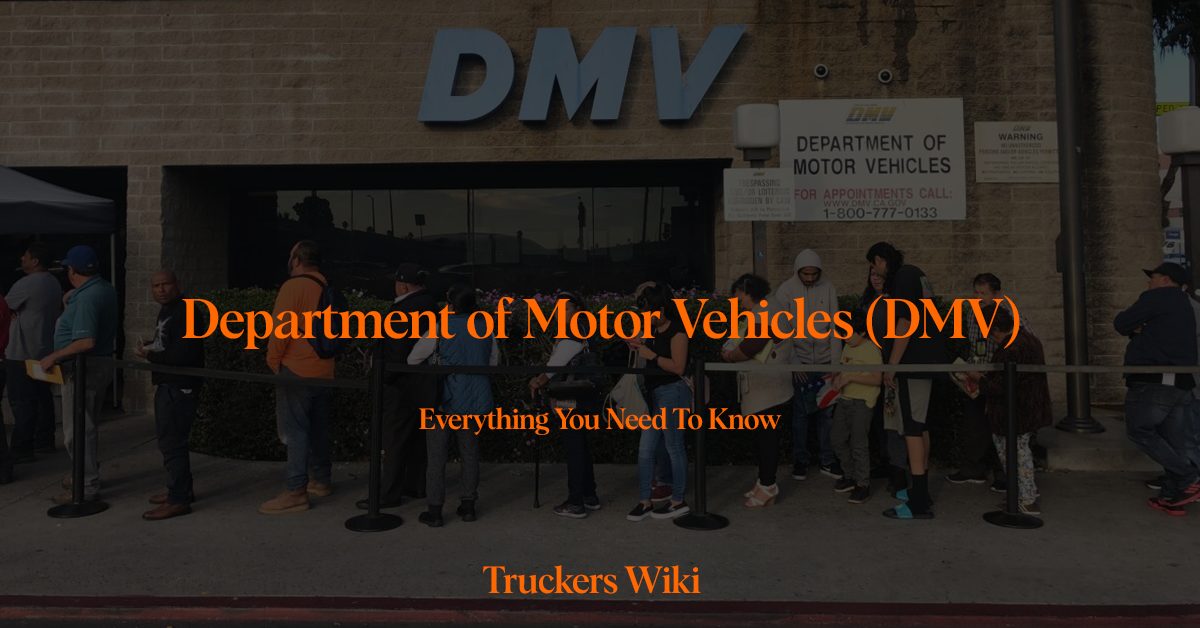
Table of Contents
Introduction to Department of Motor Vehicles – DMV
The Department of Motor Vehicles (DMV) is a familiar agency to every driver and vehicle owner. Its role and responsibilities vary from state to state, but broadly, it is tasked with the administration of vehicle registration and driver licensing. This article aims to provide a comprehensive guide on the DMV, outlining its key responsibilities, the services it provides, and its significance in the trucking industry.
What is the DMV
The DMV is a state-level government agency responsible for maintaining vehicle registration records, issuing driver’s licenses, maintaining driving records, and enforcing motor vehicle laws. While most states in the U.S. refer to this agency as the DMV, some states use different names, such as the Bureau of Motor Vehicles (BMV), Department of Public Safety (DPS), Motor Vehicle Division (MVD), or Department of Transportation (DOT).
Despite differences in naming, the main functions remain the same – to ensure that all drivers are licensed and all vehicles are registered in accordance with state laws.
Key Responsibilities of the DMV
Driver Licensing: The DMV is responsible for issuing and renewing driver’s licenses. They ensure drivers meet all requirements, such as passing written and driving tests, and maintaining a clean driving record. This includes issuing Commercial Driver’s Licenses (CDLs), which are needed for operating commercial motor vehicles.
Vehicle Registration: The DMV oversees the registration of all motor vehicles in its jurisdiction. Vehicle owners are required to register their vehicles and display the registration number (usually on a license plate) when driving.
Title Management: The DMV issues titles for vehicles, serving as a legal record of ownership. When a vehicle is sold, the title must be transferred to the new owner.
Driving Records: The DMV maintains driving records for each licensed driver. This record includes information about traffic violations, accidents, and license suspensions.
Learn more about MVR here.Enforcing Motor Vehicle Laws: The DMV helps enforce motor vehicle laws, such as emission standards, safety inspections, and insurance requirements.
DMV and the Trucking Industry
For the trucking industry, the DMV plays an especially crucial role. Here’s how:
Commercial Driver’s Licenses (CDLs): In order to operate a commercial motor vehicle (CMV), a driver needs a CDL. The DMV administers the process of obtaining a CDL, which includes a written knowledge test and a skills test.
Endorsements and Restrictions: Depending on the type of CMV and cargo, additional endorsements may be needed on a CDL. For instance, driving a truck with air brakes, a tanker, or transporting hazardous materials requires specific endorsements. The DMV oversees the process for obtaining these endorsements.
Medical Certifications: CMV drivers must meet certain medical standards, and the DMV helps manage this process, often through a medical certification tied to the CDL.
Special Registration: Some CMVs require special registration due to their size, weight, or type of cargo. The DMV helps oversee these registrations.
Conclusion
The Department of Motor Vehicles plays a crucial role in promoting safety on our roads. From ensuring only qualified drivers are behind the wheel to keeping a detailed record of vehicles and their owners, the DMV serves as a linchpin for a vast range of services and functions within the realm of motor vehicles and driving. For the trucking industry in particular, the DMV’s role in overseeing commercial driving standards is pivotal to maintaining safe and efficient operations nationwide.
Listen to The Article Here
Audio Article Department of Motor Vehicles DMV Goverment (US Gov) What is the
Last modified: January 3, 2024

